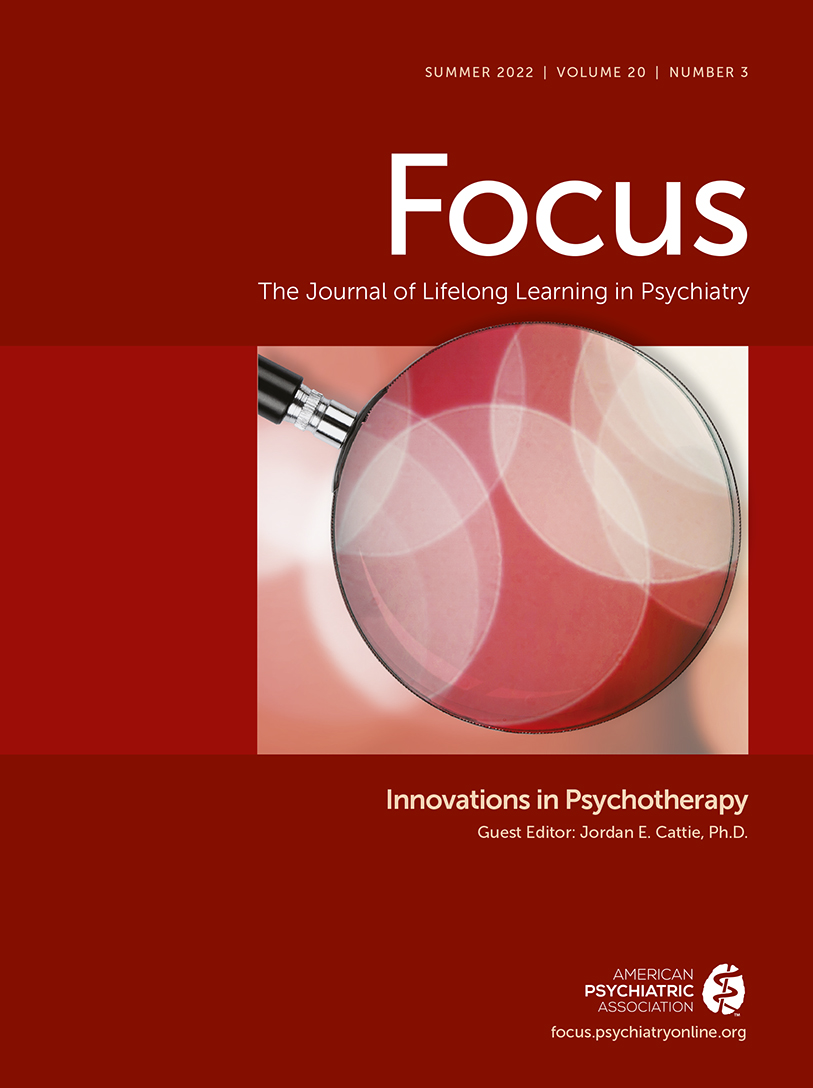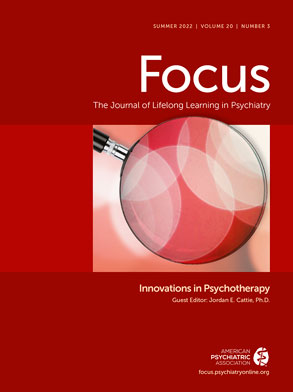Thank you to Mark Rapaport, M.D., Editor of Focus, for the opportunity to serve as Guest Editor of this issue, which focuses on innovations in psychotherapy and mental health service delivery that occurred due to, or in the wake of, the COVID-19 pandemic. The pandemic served as a forcing function; sudden disruptions to the status quo prompted a cascade of innovation that will continue to transform psychotherapy and mental health care for years to come. COVID-19 has been recognized as an unprecedented challenge, as well as an opportunity to improve mental health care and the delivery of psychotherapy. COVID-19 changed the default delivery of mental health services to telemedicine almost overnight and led to a dizzying acceleration in the development of technology tools, infrastructure, and approaches to tele–mental health. Over time, this public health emergency led to multiple collective experiences with shared challenges, alongside increasing acknowledgment of disparities and injustice. These conditions gradually but fundamentally changed perceptions of and demand for mental health services and led to far-reaching waves of individual and collective action, advocacy, and voluntarism.
The past 2 years have made numerous topics more salient and frequently discussed in psychotherapy and psychiatry practice; we review several in this issue. For example, grief, burnout, moral injury, racial trauma, and other challenging experiences were widespread, including among health care and mental health care providers. The resulting innovations are worthy of attention for their benefits to communities, organizations, and individuals. In addition, recognition of health disparities and social injustice during the pandemic prompted widespread recognition of systemic and institutional racism in health care and mental health care, and for many, increased commitment to proactively dismantle racist and discriminatory practices and policies. We review practical ways that all mental health care providers can adopt actively antiracist practices to better serve diverse communities. Finally, the prevalence of long COVID, also known as post-COVID, conditions highlights the relevance and utility of health psychology perspectives and interventions, which attend to interactions between physical health symptoms and mental health. These psychotherapy approaches and their relevance to psychiatry practice are summarized.
Even as the stresses, disruptions, and losses accumulated, stigma and internal barriers began to decrease in the context of a changing public discourse around mental health. In this new context, struggle was validated as normal and human, mental health symptoms were discussed in informative and destigmatizing ways, and people were encouraged to be aware of and responsive to their mental health needs. Requests for mental health services drastically outpaced the ability of traditional service models to meet these needs, however, leading to challenges and strain for providers and mental health treatment settings. As a result, increasing access to mental health care became a newly urgent priority, as the limitations of existing models were reached and highlighted. Equitable mental health access remains a critical priority for innovation; a quest to identify, develop, and scale promising new programs has been undertaken with new levels of support, fervor, and speed. In this issue, we summarize two such programs. One summarizes an integrated statewide crisis response system and the unique opportunities offered by coordinated response and investment in specific access points. The other describes an online platform with the capacity to train large numbers of front-line health care workers in evidence-based mental health interventions in the coming years. We also highlight the corresponding advocacy and voluntarism among the mental health care workforce that is both critical moving forward, and emblematic of this unique time.
In sum, this issue discusses some of the key developments and changes in implementation and scope of psychotherapy over the COVID-19 pandemic years and presents practical implications for practicing clinicians. One thing is certain: as a profession, there is no “going back.” We are determined to forge ahead, and it will take all of our efforts to change our spaces, delivery models, and aspects of our practice to move toward an equitable and inclusive future. Thank you to all who contributed to this issue, and to all of its readers.

